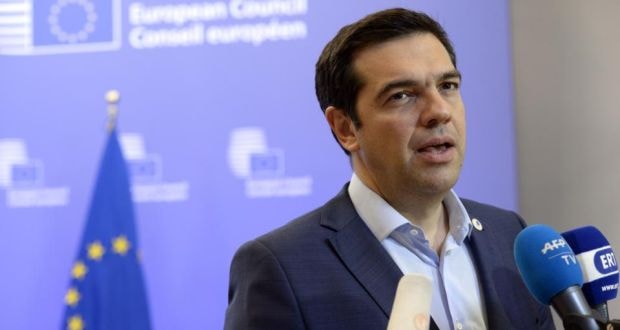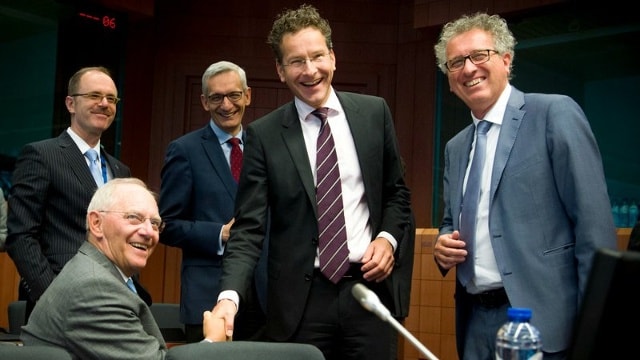Greece still can not breathe a sigh of relief
(Baonghean.vn) - The Greek debt crisis has just had a new positive development, when ngroup 19BChiefTEurozone financeYesterdayreach an agreementng,agreed to disburse 10.3 billion euros in the new bailout package and begin restructuring debt for Athens as required by the International Monetary Fund (IMF).More money disbursed, but is the future of the Greek debt crisis really brighter?
New step forward
 |
| Greek Prime Minister Alexis Tsipras faces many difficulties. Photo: AFP/Getty Images. |
After many hours of discussion with many controversies, the amount of money disbursed to Greece was finally agreed upon by EU finance ministers. 10.3 billion euros equivalent to 12 billion USD is considered the reward that the Eurogroup finance ministers give to Greece for its recent efforts.
Eurogroup President and Dutch Finance Minister Jeroen Dijsselbloem stressed that this is an important moment marking Greece's long-term efforts at austerity and tax reform.
Not only that, this agreement is also important for all parties involved in this negotiation. Remember last summer, the trust between the parties fell into a serious crisis and the Greek debt crisis seemed to be at a standstill.
Thus, according to the plan just approved, 10.3 billion euros will be disbursed in two installments: the first installment of 7.5 billion euros in June and the second installment of more than 2.5 billion euros in September. Another good news is that after this meeting, the International Monetary Fund (IMF) confirmed that it will participate in the Greek bailout program. This is really a welcome signal because during the past time, negotiations between Greece, the European Union and the IMF have always been in a deadlock.
The reason is that the parties cannot agree on a point of view. On the one hand, Germany has always opposed debt reduction for Greece and believes that the country will only be allowed to reduce its debt in 2018 if it fully implements its commitments when receiving the bailout package.
However, on the other hand, the IMF considered this a basic condition to continue funding the third bailout package for Athens. The situation at that time was very difficult when Greece was in dire need of the next disbursement to pay off its huge debt to the European Central Bank (ECB) and the IMF in July, and at the same time pay for the stagnant public spending.
"Fast-paced" joy
 |
| European finance ministers and Eurogroup President and Dutch Finance Minister Jeroen Dijsselbloem agree on a new bailout package for Greece. Photo: euractiv.com. |
However, receiving a temporary disbursement of 10.3 billion euros cannot make Greece breathe a sigh of relief. Because although the IMF has confirmed its participation in the Greek bailout, this organization has also recently commented that with the current public debt level of up to 180% of GDP, Greece is unlikely to be able to pay and needs debt relief.
In addition, the IMF has just published a report emphasizing that if the debt is not restructured, Athens could fall into an extremely difficult situation when it has to bear a public debt of up to 250% of GDP by 2060. This will be a bad future for the Greek people and government if there are no fundamental solutions.
That is the distant future, but in the near future, internal pressure in the political arena as well as from the people will also be a great difficulty for the government of Prime Minister Alexis Tsipras. Because right before the meeting of the Eurozone finance ministers, the Greek Parliament had to work very hard to pass measures including pension cuts and tax increases to increase the state budget according to the goals set by the creditors.
Just like on May 8, these measures received the support of only 153 members of the ruling coalition out of 300 members of the Greek Parliament. The opposing votes belonged to the opposition MPs. Meanwhile, because the new taxes will cost each Greek citizen about a month's salary - equivalent to about 810 euros/person/year, immediately, tens of thousands of people gathered outside the parliament building to protest.
Thus, although the immediate tension has been eased with the new 10.3 billion euro bailout, the pressure on Greece's public debt remains. The upcoming negotiations between creditors will certainly still have disagreements regarding debt relief for Greece.
Meanwhile, difficulties are piling up as Prime Minister Tsipras' government is under great pressure from the opposition. Recently, the main opposition party in Greece, the Democratic Party, accused the government of being incapable of solving the debt problem and was responsible for the delay in negotiations. The party also demanded the government resign and hold early elections.
As for the people, the oppressive “belt-tightening” life will certainly make Greeks take to the streets again, even causing clashes and attacks. All these challenges are weighing heavily on the shoulders, making it impossible for Prime Minister Tsipras to “rest his head high”.
Khang Duy








